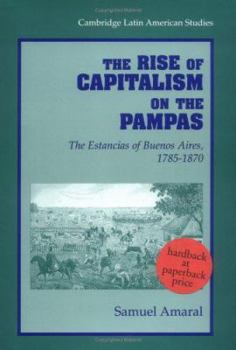The Rise of Capitalism on the Pampas: The Estancias of Buenos Aires, 1785 1870
(Book #83 in the Cambridge Latin American Studies Series)
Select Format
Select Condition 
Book Overview
In the early decades of the nineteenth century, Buenos Aires underwent rapid economic growth, only dwarfed by the even greater prosperity that occurred there at the end of the century. Previous studies have focused on the economy as a whole, or on a particular segment of the population; and most have disregarded how resources were intentionally organized to enable growth. This book focuses on the estancia - livestock firms, the economic organizations that led the growth process. The internal structure, production conditions, and economic impact of the estancia are the central issues which Amaral considers. Economic growth and increased freedom were not inevitable on the pampas, but rather the consequences of human actions, both deliberate and unintentional, in the search for an elusive profit. Why freedom, not privilege, prevailed is the key question underlying this study.
Format:Paperback
Language:English
ISBN:0521523117
ISBN13:9780521523110
Release Date:August 2002
Publisher:Cambridge University Press
Length:384 Pages
Weight:1.30 lbs.
Dimensions:0.9" x 6.1" x 9.0"
Customer Reviews
0 rating





